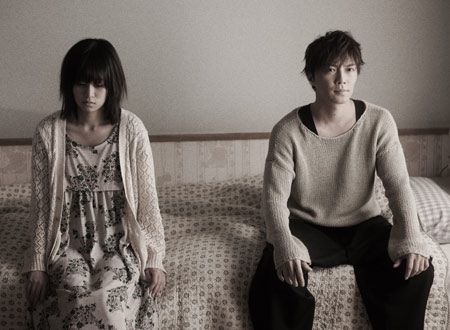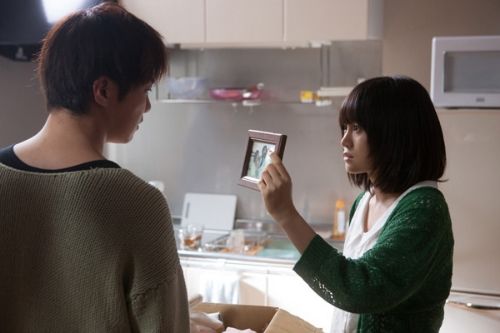
As paralyzing and hair-raising, as
some expression of horror may be, those scares tend to diminish when faced with
he passing of time. Many of the innovations that sprung out of Japan, be them
original or just executed masterfully, and most strongly associated with films
like Ring by directed by Hideo Nakata and Takashi Shimizu’s Ju-on, are not
likely to have the same effects on viewers who took in those earlier films,
aghast, when seeing the same tricks employed again. So, it stands to reason the
long haired emaciated figures of death, weird guttural sounds, and doors
creaking open and shut that occasionally phase into being in THE COMPLEX (also
by Hideo Nakata) bring few true feelings of fright. In fact, throughout a large
part of its first act, it seems intent on delivering only a vague sense of
creepiness.
It almost
feels like the film’s hand is being revealed too fast. Asuka, about to begin
studying at a nursing school, who with her family has just moved into the old
and rundown apartment building bearing the movie’s Japanese title (Kuroyuri Danchi), befriends a
little boy who plays alone way too late at night. It feels like a clear
giveaway that she has some communion with spirits of the no longer living. And at the same time, the dread induced by a
spindly, lurking, and seemingly corporeal next-door neighbor also seems to be
coming to an anticlimactic head too soon.
Yet, there are little signs that things
are amiss. The only kind of affective scares are mixed in with offbeat, even
slightly humorous touches, like the alarm that keeps waking Asuka up or the
repetitious, déjà vu inducing conversations of her parents. The arrival of a
cleaner, whose job it is to clear out and purify the dilapidated dwellings of deceased individuals who went unnoticed, and the bond he forges
with Asuka is the first strong suggestion that THE COMPLEX will take seemingly
conventional horror into some unique and intriguing places. Altogether worth
the somewhat lumbering start to get there.
As Asuka’s afflictions of terror persist and take on a more
inward quality, the film delves into issues of loneliness, grief, and
guilt…manifestations of horror that are far more real and for that, perhaps far
more relatable to audience members that feel something akin to what Asuka is
going through. It ends up evoking far more of an emotional response than the
horror genre is wont to do. And in a time where cases of depression and
discussions of mental health seem to be on the rise, it is admirable to see
such issues dealt with head on.
So too is the challenge it poses to longstanding concepts of
the nature of hauntings and the supernatural. Rather than focusing mainly on
the unresolved feelings of the supernatural beings in question, it draws its
horror in large part from the mental state of those being haunted, and typical
symptoms of terror manifest in surprising ways, bearing resemblance to
addiction, obsessive…behaviors that are not out of line with psychological
disorders.
Instead of choosing one road or the
other, the phenomenon is expressed as a strange flirtation between the presence
of entities from the spirit realm and the victims’ psychological state. As
there are few hard and fast rules that apply to genres dealing with the
supernatural (as there are with say, zombies) there is a lot of flexibility in
the proceedings, which can be frustrating if trying to pin a logic on the
movie’s critical confrontations. Or it can be dizzying fun if you’re willing to
just enjoy the ride. It involves an enraptured, blood splattered séance and a
tug-of-war between realms that reaches a frenzied, clawing conclusion with
confinement to a complete and utter isolation at stake. It is unexpectedly,
breathtakingly terrifying, and the true finale to the film, although the flame
filled sequence that follows is so vibrant in its excess, it is fun to take in
all the same.
THE COMPLEX
is nothing if not bold for its incorporation of real life issue horrors – it
joins several other Japanese films in dealing with themes of loneliness – into
a backdrop of traditional scares. Atsuko Maeda (of AKB48 fame) and Hiroki
Narimiya inject a sense of sincerity into their characters that make their
struggle seem that much more urgent.
THE COMPLEX plays the Fantasia Film Festival on July 26 at
4:45 PM. Visit the site for details.
Me on twitter = @mondocurry

No comments:
Post a Comment